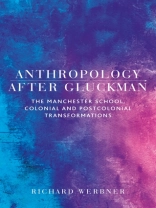Placing the Manchester School at the vanguard of modern social anthropology, this book reveals the cosmopolitan distinctiveness of the intimate circle around Max Gluckman. Such distinctiveness, Richard Werbner argues, was driven by creative difference, travelling theories and innovative, interdisciplinary approaches. The expansion of social anthropology as a dynamic, open discipline became the hallmark of the Manchester School.
The remarkable careers and legacies of the Manchester School anthropologists are shown for the first time through inter-linked social biography and intellectual history, to reach broadly across politics, law, ritual, development studies, comparative urbanism, social network analysis and mathematical sociology.
Werbner reveals that members of the circle engaged in deep dialogue, enduring friendships, and creative collaboration. The re-discovery of the complexity of their engagement and their lasting impact illuminates the exploration of the frontiers between ethnography, the sociology of knowledge, and the anthropology of colonial to postcolonial change.
表中的内容
Introduction
1 Max Gluckman in South Africa: role model, early leadership
2 Max Gluckman’s commitments, projects and legacies
3 Elizabeth Colson: home town anthropologist, systems sceptic
4 Clyde Mitchell and A.L. Epstein: urban perspectives
5 Relational thought, networks, circles
6 Friendship, interlocking directorates, cosmopolitanism
7 A. L. Epstein’s enduring argument: The reasonable man and emotion
8 Victor Turner: ‘voyage of discovery’
9 The reanalysis of Chihamba the White Spirit
10 Anthropology and the postcolonial
Conclusion
Bibliography
关于作者
Richard Werbner is Emeritus Professor in African Anthropology and Honorary Professor in Visual Anthropology at the University of Manchester












